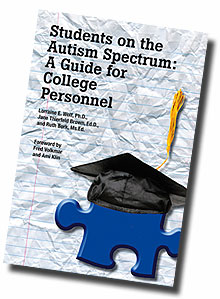  |
| HOME | THIS ISSUE | CALENDAR | PATENTS | BACK ISSUES | < BACK | NEXT > |
Administrator writes book on autism for higher ed personnelby Karen Singer - November 10, 2008
| ||||
While watching her autistic son grow up, Jane Thierfeld Brown noticed similarities between his behavior and that of some children with other disabilities, including Asperger syndrome, a higher functioning form of autism. Her observations, along with nearly three decades of research and work with autistic children, have resulted in a forthcoming book, Students on the Autism Spectrum – A Guide for College Personnel, from the Autism Asperger Publishing Co. Brown, director of student services at the UConn School of Law, is one of three co-authors. Asperger syndrome is named for Hans Asperger, who first identified the condition in 1944, describing social interaction deficits similar to autism in a group of boys with better cognitive and communication skills. Traditionally, many of these students have attended technical schools, says Brown, but the number going to college is now on the rise. “Many people diagnosed with Asperger syndrome are attending college and finding a way to navigate higher education,” Brown says. But they may encounter problems along the way, “despite their high intellectual abilities, high SATs, and high IQ scores,” she says. Academically, such students often have in-depth knowledge and intense interest in a very narrow field but lack the ability to handle curriculum covering a wide spectrum of knowledge, she says. Social settings present additional challenges. “If you don’t understand the social world or non-verbal communication [common hurdles for students with Asperger’s syndrome] how do you navigate dining halls or dorms?” says Brown. “Some students do very well, but others need a lot of support, personally, academically, and professionally.” More colleges and universities are providing that support, including UConn, which launched a program this semester based on a pilot program Brown and her colleagues ran for two years at the University of Minnesota. Students who enroll in the Strategic Education for Students with Autism Spectrum Disorders program meet weekly with a graduate adviser who helps them improve their social and interpersonal skills, so they can better cope with campus life, make connections with other students and staff, and live autonomously.
“It’s very much a student-based program, where they work very closely with one of our grad students, learning social skills management, time management, personal hygiene and care, and health and safety,” says Christine Morello, assistant director of the Center for Students with Disabilities. “They also help students identify other areas on campus that may be a resource, like tutoring.” Morello says there will also be a social component, which could be something as simple as ‘going on an outing’ to the Student Union to play video games, in order to get out of the residence hall. Brown says her new book contains material to help disability service providers work with this population on campus, including coping strategies and specific interventions for common dilemmas. “A lot of our students really have difficulty with things like shuttle bus schedules,” she says. They may need help figuring out which bus to take, for example, and can become flummoxed if they see a different bus driver. “They live by routine, and sometimes go into panic mode and shut down,” she adds. Brown says students with Asperger syndrome have done well to get as far as college. “People who are succeeding in the system had a very good K-12 education and very supportive parents involved in their education,” she says. “They have sort of made it, to be able to get that far, and hopefully, will be able to get further. There are a lot of very successful people who show those types of tendencies.” She hopes the book will not only help students with Asperger syndrome get through college but also create more opportunities for them. Adds Brown, “We also have to find a way for our colleges and educational communities to be more accepting of people who just act very differently.” |
| ADVANCE HOME UCONN HOME |

